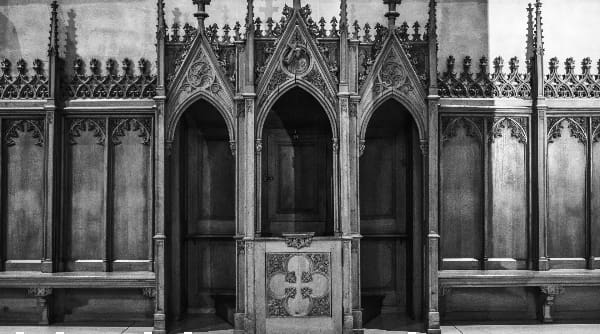Do Penance
1. “Do penance, for the kingdom of heaven is at hand.” It was thus that “Jesus began to preach” (Matt. 4:17). And thus, already before Jesus had, St. John the Baptist proclaimed in the desert to those who came out to hear him: “Do penance: for the kingdom of heaven is at hand” (Matt. 3:2). To the self-righteous Pharisees and the free-thinking Sadducees he said: “Ye brood of vipers, who hath shewed you to flee from the wrath to come [i.e., the wrathful judgment of the coming Messiah]? Bring forth, therefore, fruit worthy of penance.” Do not say, he told them, “We have Abraham for our father”—as if family and race and blood were enough. “For now the axe is laid to the root of the trees. Every tree, therefore, that doth not yield good fruit, shall be cut down, and cast into the fire” (Matt. 3:7–10). On the occasion when Our Lord was told about the Galileans whose blood Pilate had shed as they were offering sacrifice, He appealed most urgently for penance. “Think you,” He asked, “that these Galileans were sinners above all the men of Galilee, because they suffered such things? No, I say to you: but unless you shall do penance, you shall all likewise perish. Or those eighteen upon whom the tower fell in Siloe, and slew them: think you, that they also were debtors above all the men that dwelt in Jerusalem? No, I say to you; but except you do penance, you shall all likewise perish” (Luke 13:1–5). And St. Luke continues: “He spoke also this parable: A certain man had a fig tree planted in his vineyard, and he came seeking fruit on it, and found none. And he said to the dresser of the vineyard: Behold, for these three years I come seeking fruit on this fig tree, and I find none. Cut it down, therefore!” (Luke 13:6–7).
Penance is commanded for all those who have sinned, even for those who have not sinned grievously. Even the smallest sin calls for penance and can be forgiven only when it is atoned for by penance. We know to what an extent the saints were men of penance, even when they had been guilty of only small sins and imperfections. In St. Aloysius Gonzaga, God united a “marvellous innocence of life with equally marvellous penance” and St. Peter of Alcantara was adorned with “the gift of admirable penance and loftiest contemplation.” St. Augustine tells us himself in his Confessions how he lamented and did penance for the sins and failings of his youth. Penance is the entry door to the heavenly kingdom of sanctifying grace and divine sonship; it is the entry door especially to the heavenly Kingdom of Christian perfection, of holy love for God, of the fullness of the gifts of the Holy Ghost, and of the truly devout life.
The more we turn away from sin, from all that displeases God in any way or dishonors Him or wrongs Him, the more we shall be united with Him and the richer will be the life of grace and virtue in us. But that is exactly what penance means: turning away from sin, turning our back on sin: from the first feeling of dissatisfaction with sin to its complete eradication and the payment of the debt of punishment due to it; and right on to the steadfast determination to embrace always what is good and holy and what honors and glorifies God. Penance is sorrow of soul for the sins we have committed, with the firm resolution to eradicate sin from our lives and to make satisfaction to God for the insults we have offered Him in the past. It is really part of the virtue of justice. Its aim is to put an end to the injustice done to God through sin and to reestablish God’s right to our service, to the love of our whole heart and to the activity of our whole being, which is violated by sin. Who would think of doubting that the virtue of penance is a great and sublime virtue!
2. Even those who have never committed mortal sin, who have been guilty only of venial sins and faults of frailty, have need of penance. The saying of St. Ambrose in his treatise on penance is a stern one but, alas, all too true. “It is easier,” he wrote, “to find people who preserve their innocence than to find those who do fitting penance for their sins.” It so happens that we human creatures, even when we wish to do penance, have much opposition to overcome in ourselves. We do not like to hear about penance and atonement for sin and indeed, in actual fact, today in conferences and writings on spiritual things, we hear and read but little about penance. Such is the spirit of our time. And yet we all commit sin, we modern people also! And consequently, we all need to do penance. Indeed, the more intent we are on striving after perfect union with God and giving Him perfect service and living wholly and entirely for Him, the more necessary penance is for us.
Even after we have substantially overcome our sinful habits, we still need to go on doing penance. When sin has long since been forgiven by God, it still can and must be bewailed by us because it remains always something to be regretted, something that ought never to have happened. It has introduced into our relation with God something that should not have been there, something that is out of harmony in a life of true and perfect love of God. And so we can always go on making satisfaction and atonement for the sins of our past that God has already forgiven. We never know how far the punishment for sin is remitted with its guilt, how much temporal punishment for sin we still have to undergo either here on earth or hereafter in Purgatory. Naturally, then, it is of the greatest moment that, our whole life through, we should, to the best of our ability, always go on atoning and satisfying for our sins; that we should try, by a holy zeal for penance, ever anew to make reparation to the Lord for our former want of love and self-surrender and loyalty and service.
Penance and satisfaction are necessary for the sins that have already been forgiven us by God. But, alas, aren’t we all guilty of sin every day in one way or another? And haven’t we, therefore, every day fresh reason for exciting ourselves anew to contrition, atoning for our sins, performing works of penance and reparation, and making up to God for the honor of which we have deprived Him?
Yes, indeed, we all need to do penance continually. And there is even a further reason for this. Penance will help us mightily in our struggle toward the heights of the Christian life. An essential element of the interior life is humility. Now, there is scarcely anything else that makes us feel so small and humble before God, the All-Holy, who is infinitely pure and noble, than the knowledge and the sorrowful recognition of the fact that we have sinned against Him, often and grievously, in thought, word, and deed. The remembrance of our past sins and disloyalty, which God has so mercifully forgiven us, develops in us a sense of gratitude to God. It fills us with gratitude to Christ Our Savior, who, by His sufferings and death, won forgiveness for us from the Father. He to whom much has been forgiven loves much (see Luke 7:43). Penance makes us patient and strong to bear our daily crosses; it makes us understand better the vanity of the pleasures and good things of this world and helps us to free ourselves interiorly from all earthly ties. Where the spirit of penance is, there also will develop delicacy of conscience and steadfastness against everything that is contrary to God’s law and that offends Him. And, finally, not the least of the merits of penance is that it produces in the soul a deep, lasting interior spiritual joy, which is of very great value for the interior life.
3. Do penance! That is, indeed, what we do over and over again in the practice of frequent Confession. Yes, in obedience to the Lord’s call, we make up our minds to do penance. We turn away from sin, from even the smallest deliberate sin. Having before our eyes the holiness and goodness of God, we endeavor to understand better what sin means, what even venial sin means. We hate sin with our whole soul, and with our will we turn away from it completely. Our former inclination toward sin is nullified by this new aversion from sin and any sinful inclination that may still remain is swept away from the soul. And so, as far as our will is concerned, we are no longer the same person we were when we sinned. We have checked our descent, and we are now heading upward. From abhorrence of sin will come sorrow for having treated God so badly; we shall be grieved for having robbed Him of honor and for having offended Him. Finally, we shall form a definite and firm purpose of amendment for the future: a resolution to avoid sin and the occasions of sin, to make satisfaction and atonement for the sins we have committed and to make good any damage or injury they may have caused. We shall, too, pray to God fervently for forgiveness and mercy: begging Him to take away our sins, to blot them out and forgive them.
With this interior spirit of penance let us come frequently to Confession and receive the sacrament of Penance. Let us come, if possible, every week. Indeed, for religious, this is recommended and even prescribed by the Church. And the more pains we take to cultivate such a spirit of penance, the better and the more fruitfully we shall receive the sacrament of Penance.
Prayer
“Rebuke me not, O Lord, in thy indignation; nor chastise
me in thy wrath. For thy arrows are fastened in me….
There is no health in my flesh, because of thy wrath: there
is no peace for my bones, because of my sins. For my
iniquities are gone over my head: and as a heavy burden are
become heavy upon me. I will declare my iniquity: and I
will think for my sin. Forsake me not, O Lord, my God; do
not thou depart from me.”
—Ps. 37:2–5, 19, 22)
+
This article is adapted from a chapter in Frequent Confession by Fr. Benedict Baur, O.S.B. which is available from Sophia Institute Press.
Art for this post: Cover and featured image used with permission.





